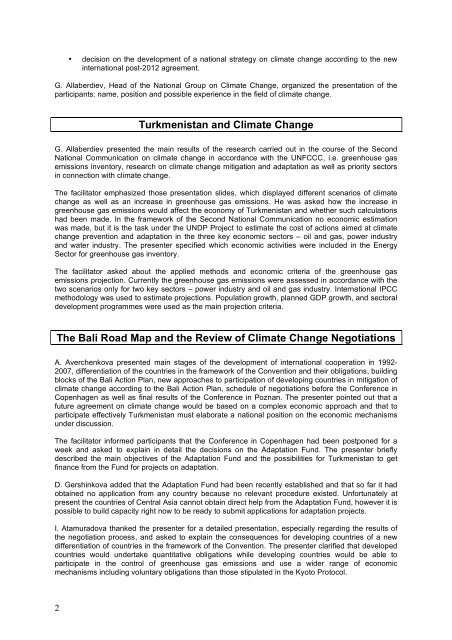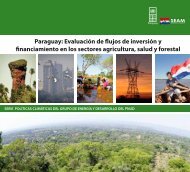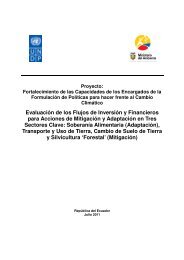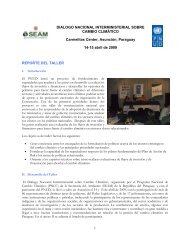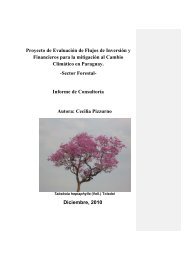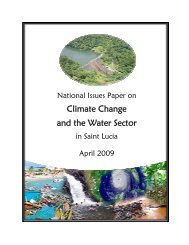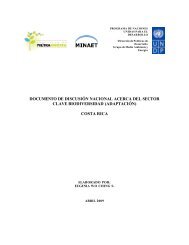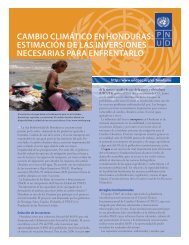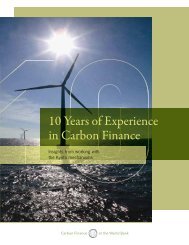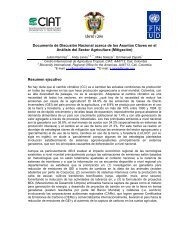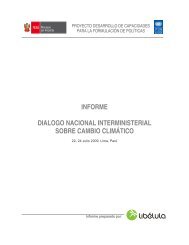national interministerial dialogue on climate change - UNDPCC.org
national interministerial dialogue on climate change - UNDPCC.org
national interministerial dialogue on climate change - UNDPCC.org
Create successful ePaper yourself
Turn your PDF publications into a flip-book with our unique Google optimized e-Paper software.
• decisi<strong>on</strong> <strong>on</strong> the development of a <str<strong>on</strong>g>nati<strong>on</strong>al</str<strong>on</strong>g> strategy <strong>on</strong> <strong>climate</strong> <strong>change</strong> according to the new<br />
inter<str<strong>on</strong>g>nati<strong>on</strong>al</str<strong>on</strong>g> post-2012 agreement.<br />
G. Allaberdiev, Head of the Nati<strong>on</strong>al Group <strong>on</strong> Climate Change, <strong>org</strong>anized the presentati<strong>on</strong> of the<br />
participants: name, positi<strong>on</strong> and possible experience in the field of <strong>climate</strong> <strong>change</strong>.<br />
Turkmenistan and Climate Change<br />
G. Allaberdiev presented the main results of the research carried out in the course of the Sec<strong>on</strong>d<br />
Nati<strong>on</strong>al Communicati<strong>on</strong> <strong>on</strong> <strong>climate</strong> <strong>change</strong> in accordance with the UNFCCC, i.e. greenhouse gas<br />
emissi<strong>on</strong>s inventory, research <strong>on</strong> <strong>climate</strong> <strong>change</strong> mitigati<strong>on</strong> and adaptati<strong>on</strong> as well as priority sectors<br />
in c<strong>on</strong>necti<strong>on</strong> with <strong>climate</strong> <strong>change</strong>.<br />
The facilitator emphasized those presentati<strong>on</strong> slides, which displayed different scenarios of <strong>climate</strong><br />
<strong>change</strong> as well as an increase in greenhouse gas emissi<strong>on</strong>s. He was asked how the increase in<br />
greenhouse gas emissi<strong>on</strong>s would affect the ec<strong>on</strong>omy of Turkmenistan and whether such calculati<strong>on</strong>s<br />
had been made. In the framework of the Sec<strong>on</strong>d Nati<strong>on</strong>al Communicati<strong>on</strong> no ec<strong>on</strong>omic estimati<strong>on</strong><br />
was made, but it is the task under the UNDP Project to estimate the cost of acti<strong>on</strong>s aimed at <strong>climate</strong><br />
<strong>change</strong> preventi<strong>on</strong> and adaptati<strong>on</strong> in the three key ec<strong>on</strong>omic sectors – oil and gas, power industry<br />
and water industry. The presenter specified which ec<strong>on</strong>omic activities were included in the Energy<br />
Sector for greenhouse gas inventory.<br />
The facilitator asked about the applied methods and ec<strong>on</strong>omic criteria of the greenhouse gas<br />
emissi<strong>on</strong>s projecti<strong>on</strong>. Currently the greenhouse gas emissi<strong>on</strong>s were assessed in accordance with the<br />
two scenarios <strong>on</strong>ly for two key sectors – power industry and oil and gas industry. Inter<str<strong>on</strong>g>nati<strong>on</strong>al</str<strong>on</strong>g> IPCC<br />
methodology was used to estimate projecti<strong>on</strong>s. Populati<strong>on</strong> growth, planned GDP growth, and sectoral<br />
development programmes were used as the main projecti<strong>on</strong> criteria.<br />
The Bali Road Map and the Review of Climate Change Negotiati<strong>on</strong>s<br />
A. Averchenkova presented main stages of the development of inter<str<strong>on</strong>g>nati<strong>on</strong>al</str<strong>on</strong>g> cooperati<strong>on</strong> in 1992-<br />
2007, differentiati<strong>on</strong> of the countries in the framework of the C<strong>on</strong>venti<strong>on</strong> and their obligati<strong>on</strong>s, building<br />
blocks of the Bali Acti<strong>on</strong> Plan, new approaches to participati<strong>on</strong> of developing countries in mitigati<strong>on</strong> of<br />
<strong>climate</strong> <strong>change</strong> according to the Bali Acti<strong>on</strong> Plan, schedule of negotiati<strong>on</strong>s before the C<strong>on</strong>ference in<br />
Copenhagen as well as final results of the C<strong>on</strong>ference in Poznan. The presenter pointed out that a<br />
future agreement <strong>on</strong> <strong>climate</strong> <strong>change</strong> would be based <strong>on</strong> a complex ec<strong>on</strong>omic approach and that to<br />
participate effectively Turkmenistan must elaborate a <str<strong>on</strong>g>nati<strong>on</strong>al</str<strong>on</strong>g> positi<strong>on</strong> <strong>on</strong> the ec<strong>on</strong>omic mechanisms<br />
under discussi<strong>on</strong>.<br />
The facilitator informed participants that the C<strong>on</strong>ference in Copenhagen had been postp<strong>on</strong>ed for a<br />
week and asked to explain in detail the decisi<strong>on</strong>s <strong>on</strong> the Adaptati<strong>on</strong> Fund. The presenter briefly<br />
described the main objectives of the Adaptati<strong>on</strong> Fund and the possibilities for Turkmenistan to get<br />
finance from the Fund for projects <strong>on</strong> adaptati<strong>on</strong>.<br />
D. Gershinkova added that the Adaptati<strong>on</strong> Fund had been recently established and that so far it had<br />
obtained no applicati<strong>on</strong> from any country because no relevant procedure existed. Unfortunately at<br />
present the countries of Central Asia cannot obtain direct help from the Adaptati<strong>on</strong> Fund, however it is<br />
possible to build capacity right now to be ready to submit applicati<strong>on</strong>s for adaptati<strong>on</strong> projects.<br />
I. Atamuradova thanked the presenter for a detailed presentati<strong>on</strong>, especially regarding the results of<br />
the negotiati<strong>on</strong> process, and asked to explain the c<strong>on</strong>sequences for developing countries of a new<br />
differentiati<strong>on</strong> of countries in the framework of the C<strong>on</strong>venti<strong>on</strong>. The presenter clarified that developed<br />
countries would undertake quantitative obligati<strong>on</strong>s while developing countries would be able to<br />
participate in the c<strong>on</strong>trol of greenhouse gas emissi<strong>on</strong>s and use a wider range of ec<strong>on</strong>omic<br />
mechanisms including voluntary obligati<strong>on</strong>s than those stipulated in the Kyoto Protocol.<br />
2


